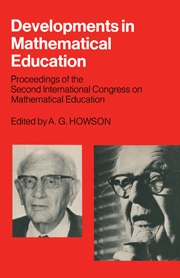 Developments in Mathematical Education
Developments in Mathematical Education Book contents
- Frontmatter
- Contents
- Editor's Acknowledgements
- PART I A CONGRESS SURVEY
- PART II THE INVITED PAPERS
- PART III A SELECTION OF CONGRESS PAPERS
- Investigation and problem-solving in mathematical education
- Intuition, structure and heuristic methods in the teaching of mathematics
- Mathematics and science in the secondary school
- Geometry as a gateway to mathematics
- The International Baccalaureate
- The role of axioms in contemporary mathematics and in mathematical education
- Implications of the work of Piaget in the training of students to teach primary mathematics
- Are we off the track in teaching mathematical concepts?
- Appendices
- Index
Investigation and problem-solving in mathematical education
from PART III - A SELECTION OF CONGRESS PAPERS
- Frontmatter
- Contents
- Editor's Acknowledgements
- PART I A CONGRESS SURVEY
- PART II THE INVITED PAPERS
- PART III A SELECTION OF CONGRESS PAPERS
- Investigation and problem-solving in mathematical education
- Intuition, structure and heuristic methods in the teaching of mathematics
- Mathematics and science in the secondary school
- Geometry as a gateway to mathematics
- The International Baccalaureate
- The role of axioms in contemporary mathematics and in mathematical education
- Implications of the work of Piaget in the training of students to teach primary mathematics
- Are we off the track in teaching mathematical concepts?
- Appendices
- Index
Summary
Investigation can play a vital part in the learning of mathematical concepts and in problem-solving. At all stages the teacher has an essential part to play. He sets the scene, providing real materials or a challenging problem when necessary. He observes what his pupils do with these and asks questions which will help their learning.
There are different stages in learning by investigation. All are important for sound and lasting learning.
(1) Free exploration. A problem arises, or the teacher asks a question. The children use materials which they find for themselves or which are provided by their teacher. When materials are not necessary pupils explore the problem for themselves. Very often they will discover relations which the teacher has not thought of. These should not be rejected but postponed if the teacher wants to pursue a particular concept.
(2) Directed discovery. Here the teacher wants the pupils to investigate a particular idea which has developed during the first stage. This is probably the idea which the teacher originally planned to develop. His questions are now focused on the concept he has in mind. Since pupils vary in background, in ability and in attitude, it is useful to group them so that questions can be appropriate to the needs of each group.
- Type
- Chapter
- Information
- Developments in Mathematical EducationProceedings of the Second International Congress on Mathematical Education, pp. 213 - 221Publisher: Cambridge University PressPrint publication year: 1973


